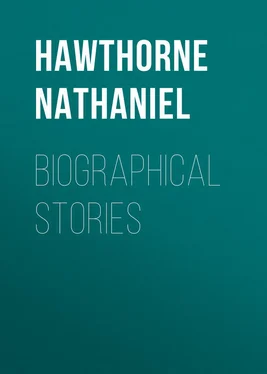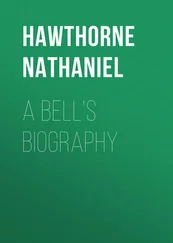We shall mention only a single incident more. The picture of Christ Healing the Sick was exhibited at the Royal Academy in London, where it covered a vast space and displayed a multitude of figures as large as life. On the wall, close beside this admirable picture, hung a small and faded landscape. It was the same that little Ben had painted in his father’s garret, after receiving the paint-box and engravings from good Mr. Pennington.
He lived many years in peace and honor, and died in 1820, at the age of eighty-two. The story of his life is almost as wonderful as a fairy tale; for there are few stranger transformations than that of a little unknown Quaker boy, in the wilds of America, into the most distinguished English painter of his day. Let us each make the best use of our natural abilities as Benjamin West did; and, with the blessing of Providence, we shall arrive at some good end. As for fame, it is but little matter whether we acquire it or not.
“Thank you for the story, my dear father,” said Edward, when it was finished. “Do you know that it seems as if I could see things without the help of my eyes? While you were speaking I have seen little Bert, and the baby in its cradle, and the Indians, and the white cow, and the pigs, and kind Mr. Pennington, and all the good old Quakers, almost as plainly as if they were in this very room.”
“It is because your attention was not disturbed by outward objects,” replied Mr. Temple. “People, when deprived of sight, often have more vivid ideas than those who possess the perfect use of their eyes. I will venture to say that George has not attended to the story quite so closely.”
“No, indeed,” said George; “but it was a very pretty story for all that. How I should have laughed to see Ben making a paint-brush out of the black cat’s tail! I intend to try the experiment with Emily’s kitten.”
“O no, no, George!” cried Emily, earnestly. “My kitten cannot spare her tail.”
Edward being an invalid, it was now time for him to retire to bed. When the family bade him good night he turned his face towards them, looking very loath to part.
“I shall not know when morning comes,” said he, sorrowfully. “And besides, I want to hear your voices all the time; for, when nobody is speaking, it seems as if I were alone in a dark world.”
“You must have faith, my dear child,” replied his mother. “Faith is the soul’s eyesight; and when we possess it the world is never dark nor lonely.”
The next day Edward began to get accustomed to his new condition of life. Once, indeed, when his parents were out of the way and only Emily was left to take care of him, he could not resist the temptation to thrust aside the bandage and peep at the anxious face of his little nurse. But, in spite of the dimness of the chamber, the experiment caused him so much pain that he felt no inclination to take another look. So, with a deep sigh, here signed himself to his fate.
“Emily, pray talk to me!” said he, somewhat impatiently.
Now, Emily was a remarkably silent little girl, and did not possess that liveliness of disposition which renders some children such excellent companions. She seldom laughed, and had not the faculty of making many words about small matters. But the love and earnestness of her heart taught her how to amuse poor Edward in his darkness. She put her knitting-work into his hands.
“You must learn how to knit,” said she.
“What! without using my eyes?” cried Edward.
“I can knit with my eyes shut,” replied Emily.
Then with her own little hands she guided Edward’s fingers while he set about this new occupation. So awkward were his first attempts that any other little girl would have laughed heartily. But Emily preserved her gravity, and showed the utmost patience in taking up the innumerable stitches which he let down. In the course of an hour or two his progress was quite encouraging.
When evening came, Edward acknowledged that the day had been far less wearisome than he anticipated. But he was glad, nevertheless, when his father and mother, and George and Emily, all took their seats around his chair. He put out his hand to grasp each of their hands, and smiled with a very bright expression upon his lips.
“Now I can see you all with my mind’s eye,” said he. “And now, father, pray tell us another story.”
Конец ознакомительного фрагмента.
Текст предоставлен ООО «ЛитРес».
Прочитайте эту книгу целиком, купив полную легальную версию на ЛитРес.
Безопасно оплатить книгу можно банковской картой Visa, MasterCard, Maestro, со счета мобильного телефона, с платежного терминала, в салоне МТС или Связной, через PayPal, WebMoney, Яндекс.Деньги, QIWI Кошелек, бонусными картами или другим удобным Вам способом.












